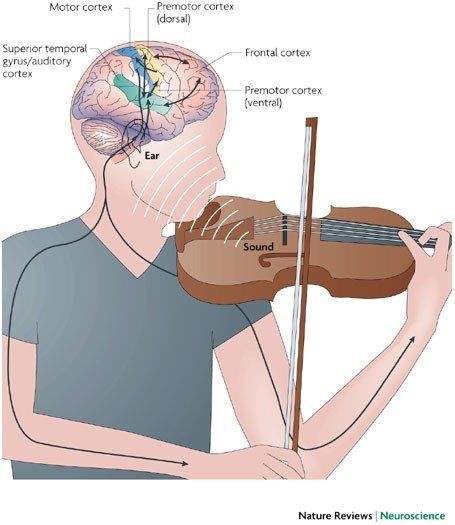We all know that music plays a huge role in our everyday lives. It helps us focus on our daily tasks and helps us relax when we are stressed out. Music helps us change our mood by changing how we perceive the world. So what happens to your brain when you listen to music?
Research shows us that it might be the secret to improving test scores, as well as our long-term well-being in life. In today’s post, we will take a look at 5 ways that science has shown music affects our brains!
Music Can Relieve Anxiety
Stress and anxiety are part of our daily lives, and we all have different methods to help calm ourselves when things get stressful at work or in our personal life. Research done by Dr. David Lewis-Hodgson of Mindlab International shows that music can help reduce anxiety and stress levels by up to 65%. A study was conducted on participants who had to solve a puzzle as quickly as possible. While solving the puzzle, the participant’s brain activity, heart rate, rate of breathing, and blood pressure were being measured.
According to Dr. David, music helped the participants to relieve anxiety and concentrate on the tasks at hand. Marconi Union’s song ‘Weightless’ resulted in a 65% reduction in participant’s anxiety and reduced their physiological resting rates by 35%. The song managed to slow the participant’s heart rate down, by lowering the levels of the stress hormone cortisol. Pretty amazing!
Music Can Boost Memory
Ever heard of the documentary Alive Inside: A Story of Music and Memory. This award-winning documentary by Michael Rossato-Bennett follows the social worker Dan Cohen. Dan is bringing music to people diagnosed with dementia in nursing homes. He creates individual playlists by asking family members to list the songs the patients once enjoyed.
The documentary shows how patients came back to life and started to feel like their former selves when listening to their individual playlists. Henry, a 94-year-old home resident diagnosed with dementia, claimed to start recalling aspects of his life which he couldn’t remember before the music therapy started.
The WWII veteran John who suffered severe dementia remained still in his wheelchair until hearing his favorite music. After the music therapy, John started singing along and dance in his wheelchair.
Music stimulates the centers of the brain that deal with concentration, organization, and information retention. These play essential roles in categorizing memories, making music therapy a critical tool for people with dementia.
Music Helps You Sleep Better
Listening to relaxing music can put the body in the same state of relaxation as when you sleep. This results in a slower heart rate, slower breathing, and lower blood pressure levels. Research shows that a pre-bedtime music listening session will help you fall and stay asleep.
Sleep has an indirect effect on our overall mood and emotional state. Depression, anxiety, stress, and other mood disorders are tightly connected to sleep problems. Insomnia also makes us more vulnerable to stress. Simply put, music has the power to activate and influence the emotional and memory centers of our brain, which is beneficial when you go to bed.
Music Can Relieve Pain
Pain and sleeping problems are closely related to each other. Pain interferes with sleep, and sleeping poorly increases our sensitivity to pain. If you improve your sleep, you’re likely to reduce physical pain (and vice-versa).
A study made by researchers from Queen Mary University of London shows that listening to music was associated with a reduction in postoperative pain. Music also decreased patient’s anxiety and reduced the use of painkillers post-surgery. So how can music relieve post-surgery pain? Your favorite music puts you in a better mood. When you’re in a good mood, the brain starts to release neurochemicals and hormones that stimulate your immune system and decrease pain.
Music Enhances Performance
In 2012, Costas Karageorghis of Brunel University in London wrote that music acts as a “type of legal performance-enhancing drug”. For many athletes around the world, music is essential for peak performance. When listening to music, people run longer, swim faster, and lift heavier – usually without realizing it. Music can elevate your mood and motivate you to push through the fatigue. Scientists don’t know exactly why music can be such a powerful tool while working out. The hypothesis is that the tempo of the music (BPM) helps us get by performing repetitive tasks.
Conclusion
As you can see, there are countless ways that music affects your brain. Music can ease pain and improve your sleep, as well as increasing your performance. Music therapy has also been proved to be effective with memory retention in people with dementia.
It’s worth mentioning that studies on how music affects our brain are relatively new, but it sure looks promising for all music lovers out there! Who knows what science will discover in the next 10-15 years!
Martin Kristiansen is the founder of HomeStudioIdeas.com. He has been playing, recording, and producing music for the last 10 years.

